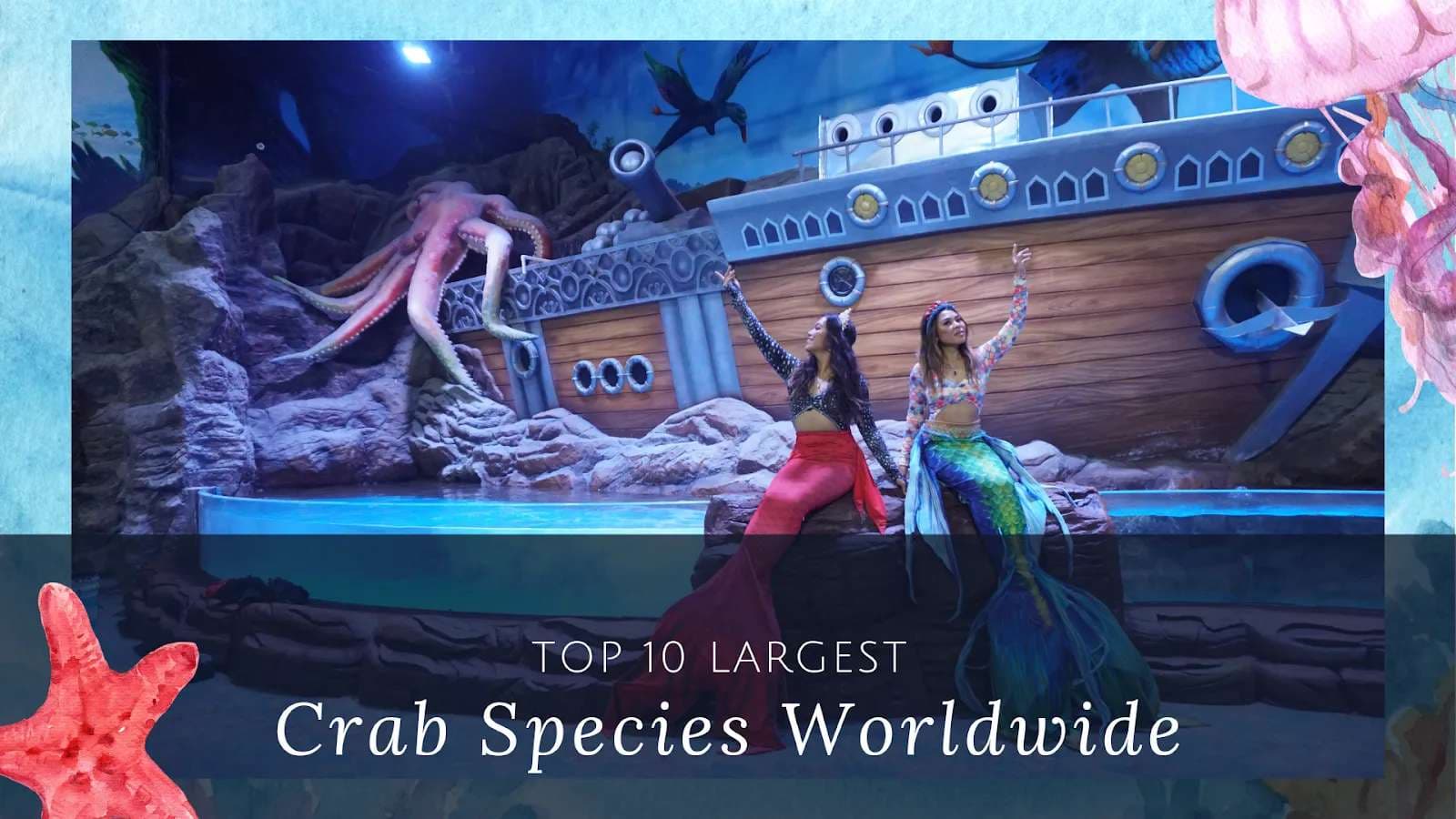
Top 10 Largest Crab Species Worldwide


Child Ticket - Aquarium Paradise


Adult Ticket - Aquarium Paradise


FUNWEDNESDAY – Buy 1, Get 1 Free
Compare the largest crab in the world like the Japanese Spider and Coconut Crab. Explore traits, habitats, and conservation efforts. Click to know more!
Crabs are among the most fascinating creatures found in our oceans and shores. With their tough exoskeletons, sideways scuttles, and powerful claws, they’ve captured the interest of marine biologists and aquarium enthusiasts alike. But beyond their quirky movements and varied colours, some crabs stand out for another reason, their sheer size.
In this blog, we explore the largest crab species in the world, from deep-sea giants to coastal titans. Each of these crustaceans offers a unique glimpse into the diverse world beneath the waves.
1. Japanese Spider Crab
The Japanese Spider Crab is widely recognized as the largest crab in the world. Native to the waters around Japan, this deep-sea species can appear intimidating due to its enormous legs, which can span wider than a car. These crabs are generally docile and tend to dwell at depths of up to 600 meters, feeding on decaying animals and plant material.
Despite their monstrous appearance, Japanese Spider Crabs are known for their gentle behaviour and slow movement. Their elongated legs and spindly frame help them camouflage among sea rocks and coral, making them surprisingly elusive in their natural habitat.
- Size: Leg span up to 12 feet (3.7 meters); body size ~16 inches
- Features: Long spindly legs, orange body with white spots
- Scientific Name: Macrocheira kaempferi
- Lifespan: Up to 100 years
2. Tasmanian Giant Crab
Native to the southern coasts of Australia, the Tasmanian Giant Crab is a cold-water species known for its powerful claws and heavy body. Found in deep ocean waters between 20 and 800 meters, this crab can weigh up to 13 kilograms, making it one of the heaviest crabs on Earth.
This species plays a vital role in marine ecosystems by feeding on slow-moving prey and scavenging debris from the sea floor. Due to its size and strength, it’s a prized catch in Australian fisheries, although conservation efforts are in place to prevent overharvesting.
- Size: Up to 18 kg in weight; carapace width ~46 cm
- Features: Red upper shell, cream-coloured claws, robust build
- Scientific Name: Pseudocarcinus gigas
- Lifespan: Around 30–40 years
3. Coconut Crab
The Coconut Crab is massive and famous for its incredible climbing and coconut-cracking abilities. As the largest terrestrial arthropod, this crab can climb palm trees and use its pincers to break open coconuts, a rare feat in the animal world.
Found on islands across the Indian and Pacific Oceans, Coconut Crabs are known for their strength and colourful bodies. Despite being solitary and slow-moving, they’re a top predator in their habitat, feeding on fruits, carrion, and even smaller animals.
- Size: Leg span up to 3 feet; weight up to 4 kg
- Features: Strong claws, purple or orange body, tree-climbing ability
- Scientific Name: Birgus latro
- Lifespan: Over 60 years
4. Giant Mud Crab
Also known as the Mangrove Crab or Scylla Crab, the Giant Mud Crab is a heavyweight crustacean native to mangrove regions across Asia, Africa, and Australia. These crabs surive in brackish waters and are widely farmed for their meat, which is highly valued in culinary cultures.
These crabs are adaptable and aggressive, often engaging in fights with other crabs. Their broad claws and dark green to black shells make them easily recognizable in markets and mangrove swamps alike.
- Size: Carapace width up to 25 cm
- Features: Dark green shell, muscular claws, semi-aquatic habitat
- Scientific Name: Scylla serrata
- Lifespan: Around 3–4 years
5. Red King Crab
The Red King Crab reigns over the cold waters of the Bering Sea and North Pacific. It’s both a marvel of nature and a seafood delicacy. These crabs migrate with the seasons and are often found in large clusters on the seafloor.
Their bright red shell and spiny legs make them stand out. Although they’re heavily fished, strict quotas help maintain sustainable populations. Watching one of these majestic crabs up close is an awe-inspiring experience.
- Size: Leg span up to 1.8 meters; weight up to 12 kg
- Features: Spiny red legs, powerful claws, cold-water habitat
- Scientific Name: Paralithodes camtschaticus
- Lifespan: 20–30 years
6. Dungeness Crab
Named after the Dungeness Spit in Washington State, this crab is found along the Pacific coasts of North America. While not as massive as others on this list, its width and meat quantity make it one of the most important crabs in U.S. fisheries.
Dungeness Crabs are known for their sweet meat and wide, fan-like carapace. They are bottom-dwellers and play an important role in balancing benthic ecosystems.
- Size: Carapace width up to 25 cm
- Features: Brown to purple shell, wide flat body, sweet flavour
- Scientific Name: Metacarcinus magister
- Lifespan: 8–13 years
7. Blue Crab
Famed for its blue-tinted claws and olive shell, the Blue Crab is a culinary favourite across the Atlantic and Gulf coasts. It is known for its agile swimming, made possible by its paddle-shaped back legs.
Blue Crabs are aggressive scavengers and active swimmers, making them both entertaining to watch and challenging to catch. Their populations are carefully managed due to high demand.
- Size: Shell width up to 23 cm
- Features: Blue claws, olive shell, strong swimmer
- Scientific Name: Callinectes sapidus
- Lifespan: 3–4 years
8. Opilio Crab
Also known as the Snow Crab, the Opilio Crab is found in the frigid waters of the North Atlantic and Arctic Oceans. It became widely popular due to commercial crabbing featured in shows like Deadliest Catch.
These crabs are known for their long, slender legs and delicate white meat. They are harvested sustainably under tight regulations to ensure population health.
- Size: Leg span up to 90 cm
- Features: Long legs, hard white carapace, cold-water dwelling
- Scientific Name: Chionoecetes opilio
- Lifespan: 6–10 years
9. Brown Crab
Common in Europe, the Brown Crab is known for its pie-crust-shaped shell and meaty claws. It’s heavily fished and a staple in UK and Irish seafood cuisine.
These crabs are relatively docile and spend most of their time hiding under rocks or in crevices. Their dull brown colour provides excellent camouflage against sandy sea beds.
- Size: Carapace width up to 25 cm
- Features: Brown shell, large white claws, rounded shape
- Scientific Name: Cancer pagurus
- Lifespan: Up to 20 years
10. Florida Stone Crab
The Florida Stone Crab is famed for its claws — so much so that only the claws are harvested (the crab is returned to the sea alive). These crabs regenerate lost claws, making them a unique model of sustainable seafood.
Found in the southeastern U.S., their bright orange claws with black tips are their most defining trait. Stone Crab claws are prized for their firm, sweet meat.
- Size: Claw length up to 20 cm; carapace width ~15 cm
- Features: Orange shell, regenerative claws, harvested for claws only
- Scientific Name: Menippe mercenaria
- Lifespan: Up to 8 years
Explore Marine Wonders at Aquarium Paradise
Aquarium Paradise in Bangalore invites you to explore the vibrant beauty of marine life, featuring over 60 species of freshwater and saltwater fish—like Clownfish, Neon Tetras, Mollies, and Oscars. The star attraction is India’s longest 180° underwater tunnel, offering a stunning, immersive view of aquatic creatures swimming above and around you. Add to that the mesmerising Jellyfish Room, cascading artificial waterfalls, and the whimsical Mermaid Shows, and it’s a destination that truly delights all ages.
Be it a family outing, a curious learner, or someone chasing the perfect shot, Aquarium Paradise offers something captivating for all. The Ocean Window Seating Lounge adds a perfect touch for quiet reflection or a great photo opportunity.
Get ready to be amazed, plan your visit to Aquarium Paradise today and experience the underwater world like never before!
More To Read

6.17.2025
Top 10 Largest Crab Species Worldwide
Compare the largest crab in the world like the Japanese Spider and Coconut Crab. Explore traits, habitats, and conservation efforts. Click to know more!
.webp&w=3840&q=75)
9.4.2025
Top 10 Kids' Fun Places in Bangalore in 2026
Find the best kids’ fun places in Bangalore in 2026, from Aquarium Paradise and Snow City to Cubbon Park and Bannerghatta. Indoor & outdoor picks for every age.

5.22.2025
Explore the Mesmerizing Aqua Tunnel in Bengaluru
Discover Bengaluru's Aqua Tunnel, a top tourist spot with stunning aquatic displays and interactive experiences. Plan your visit today!

5.16.2025
Mesmerising Little Mermaid Shows Near You
Discover the magic of Aquarium Paradise in Bangalore with its unique underwater tunnel, mermaid show, and interactive marine experiences. Get more info here.
